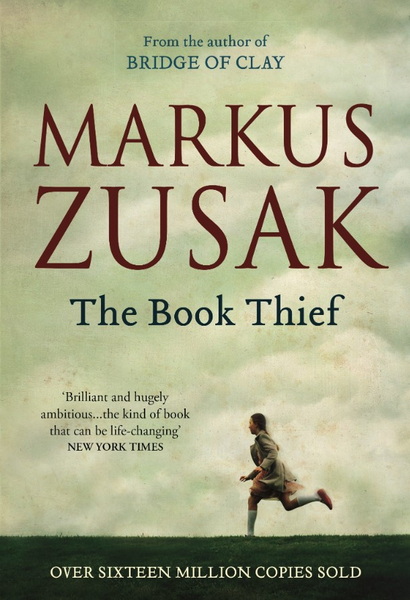The Book Thief by Markus Zusak
Reviewed by Michael Attard
We meet Liesel Meminger just before her tenth birthday. It is January, 1939, not far from the German city of Munich. While traveling with her mother and younger brother, her brother dies. She is left with foster parents. She does not understand why her mother leaves her, but she had a sense of being saved. At her brother’s funeral, one of the grave diggers had dropped a book. Liesel picked it up. She could neither read nor write, but she kept the book, entitled The Grave Digger’s Handbook.
In the story, it becomes clear early that the narrator is “Death.” This distinctive form of storytelling creates a magical atmosphere which transcends what readers normally expect. The book is a war story, and Death is an appropriate entity to tell it. But the author does not paint Death as omniscient; rather, Death is an onlooker, puzzled and amazed by the extreme duality people exhibit. Death perceives human uniqueness in the thousands of colors that he sees in the sky, marking the places where he must go to gather the soul.

Liesel’s loving foster parents become Papa and Mama, and Papa was always there when she had her regular nightmares. Rudy, the boy next door, became her best friend. The characters are developed in detail. Even minor figures are described with a depth of keen observation twining them into an intricate part of the story, someone whom the reader cares about.
The author, through Death, makes use of metaphor. In describing Papa, he says of his eyes, “They were made of kindness, and silver.” Papa did not support Hitler. It does not take long for Liesel to conclude that her family’s problems stem from the Führer. At a bonfire to burn all the books that offend Hitler, Liesel retrieves a burning cover from the ashes and steals it away, almost secretly.
Unexpectantly, a man named Max appears and asks Papa if he still plays the accordion. Profound desperation is painted by the author: “The young man’s voice was scraped out and handed across the dark like it was all that remained of him.” The accordion is an often but subtly used metaphor throughout. As long as the accordion breathed, there was life. Max becomes Liesel’s friend. He is a Jew in hiding, and Liesel understands his plight. Death tells us that Max “breathed like a fugitive. Desperate yet soundless.”
Liesel purloins another book and, in a lighter mood, we watch her and Rudy, sometimes along with a group of boys, steal apples and potatoes. Although not crucial to the story, the fruit and vegetable thievery illustrates a lucid picture of kids being kids, even during a war, which highlights their unassailable humanness. At one point, Liesel and Rudy decide to work on their own without the gang. “Their plan was perfect but for one thing. They had no idea where to start.”
The war begins to get closer to home. People are “stripped of their living arrangements.” They often beg Death to take them with him. Death tells us that “some years, the souls and bodies don’t add up; they multiply.”
The stark contrast between human kindness and cruelty is the major theme of the book. Unforeseen changes in daily life begin to hone in more and more on the cruelty. Soldiers marched a parade of Jews through the town. Liesel hoped that “they could read the depth of sorrow in her face.” One old man, “weightless as he was, he was too heavy for his legs to carry.”
Another theme is the power of words. Liesel’s knowledge of this power is innate, and that is why she goes to the extreme of stealing books. She receives a few books as gifts, including one that Max writes for her. She learns to read well and comforts those in a basement sheltering from the falling bombs.
Papa and Rudy’s father are drafted into the army. Mama sat with the accordion and “Her fingers hovered above the keys.” Silence. “The keys were not struck. The bellows didn’t breathe.” A neighbor who returned from the fighting with a mangled hand that refused to stop dripping blood commits suicide. Then there is a reprieve. Papa breaks a leg and is sent home. “Yes, it was a great night to be Liesel Meminger, and the calm, the warm, and the soft would remain for approximately three more months.”
Death telling us that there will be calm for three more months is a foreshadowing. At various points, the author through Death reveals to us events that come later. Maybe this is a technique to keep the reader interested or engaged. It may also be used to portray the theme of mortality, specifically, the mortality of the reader. However, at the beginning of “Part Ten,” Death offers his own reasoning. “Again, I offer you a glimpse of the end. Perhaps it’s to soften the blow for later, or to better prepare myself for the telling.”
“The sirens were too late.”
The author of this touching historical fiction is Markus Zusak. Published in 2005, it has become a bestseller, been translated into 63 languages, and sold 16 million copies. In 2013, it was adapted into a feature film.
The Reviewer
Michael Attard is a Canadian who has lived in Gwangju since 2004. Though officially retired, he still teaches a few private English classes. He enjoys reading all kinds of books and writes for fun. When the weather is nice, you may find him on a hiking trail.





